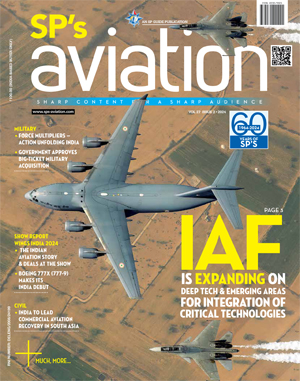INDIAN ARMED FORCES CHIEFS ON
OUR RELENTLESS AND FOCUSED PUBLISHING EFFORTS

SP Guide Publications puts forth a well compiled articulation of issues, pursuits and accomplishments of the Indian Army, over the years

I am confident that SP Guide Publications would continue to inform, inspire and influence.

My compliments to SP Guide Publications for informative and credible reportage on contemporary aerospace issues over the past six decades.
Power Projection - On the Rise

India’s transformation into a prosperous and developed country would depend largely on how well the IAF defends its national interests through effective deterrence and rapid response if and when needed
As it celebrat es its 79th anniversary, the Indian Air Force (IAF) is expected to do far more than its traditional tasks of defending national air space and supporting operations of the Indian Army and the Navy. Whether or not India aspires to be a regional power is a moot question but it is clear that India’s size, population, rising economic profile and above all her strategically important location at the head of the Indian Ocean, would not allow her the luxury of a benign environment. In fact India’s security challenges might become even more daunting as its economy marches on.
India’s former President Dr A.P.J. Abdul Kalam and the father of the country’s missile programme, had articulated a vision of India as a developed country by 2020; an ambitious but benign goal for a country like India. Another visionary, defence and security analyst, Late K. Subramanian, saw India as the ‘knowledge power’ of the 21st century. Prime Minister Dr Manmohan Singh has once again demanded the restructuring of the UN Security Council and often said that there was enough space in Asia for both China and India to grow.
The National Security Advisor (NSA) Shiv Shankar Menon while delivering the Shyam Bhatia Memorial Lecture on August 11, 2011, said, “Our primary task now and for the foreseeable future is to transform and improve the life of the unacceptably large number of our compatriots who live in poverty, disease and illiteracy. This is our overriding priority, and must be the goal of our internal and external security policies. Our quest is the transformation of India, nothing less and nothing more.” He went on to add, “Our goal must be defence, not offense, unless offense is necessary for deterrence or to protect India’s ability to continue its own transformation.” While this is undoubtedly a laudable aim and however peaceful our intentions, the moot point is whether the world would leave India alone to pursue its agenda of economic and social development. Given our collective inhibitions and reluctance, India would never declare its national ambitions and remain a reluctant debutante but that would still not reduce its security challenges. The NSA has also cautioned the media and the strategic community to refrain from hyping and sensationalising military threats from China lest these became self-fulfilling prophecies. We cannot however forget that India has always been an important country and hence will remain forever under the watchful eye of its friends and adversaries.
In a record of sorts, all heads of state of the P-5 countries visited India in 2009-10. Some observers saw this as evidence of India’s rising importance in international affairs while others felt that such an interest was primarily driven by economic opportunities to invest in and trade with India. Whatever the truth, India can no longer ignore the variety of security challenges.
With the US planning a pull out from Afghanistan by 2014, it is likely that the South Asian security environment would get even more uncertain if not dangerous. The present uncertain conditions in India’s Northwest may further enhance the threat of Pakistani nuclear weapons falling into the jihadi hands.
The recent alleged confrontation between INS Airavat and the PLA Navy off the coast of Vietnam and the reported snooping by PLA Navy vessels in the Bay of Bengal at the time of India’s long-range missile tests also indicate the nature of current and future security challenges.
The Chinese PLA activities in Pakistan occupied Kashmir (PoK) and its assertive if not belligerent stand along the border in Laddakh and Arunachal Pradesh do not augur well for India.
Even a cursory glance at the country’s post-independence history shows that a defensive security strategy places added burden on the military, as such a strategy always leaves the initiative with the enemy. India’s legendary strategic restraint is undoubtedly admired by many around the world but is also sometimes misunderstood as a sign of weakness with the result that at least one neighbour has regularly attempted to exploit India’s perceived weakness and reluctance to use force.
India has to try its utmost to prevent the outbreak of war and prevail after an outbreak to severely limit its scope and duration. The IAF as the foremost and most dominant instrument of air power has the onerous responsibility of deterring a potential adversary. This is simply because it is the IAF that alone can provide instantaneous and yet carefully calibrated response in an evolving threat scenario.
The biggest challenge that India will face in the coming years would be to avoid conventional conflicts while simultaneously preventing terror strikes and severely restricting any unintended flare up or border skirmish from developing into a larger conflagration.
The first and foremost objective of the IAF is thus effective deterrence which ironically can be achieved only by further sharpening its capability to strike hard and with precision.
Economic progress has given a fillip to India’s exports which now constitute about 20 per cent of India’s gross domestic product (GDP). Any threats of disruption to sea lines of communications (SLOC) can adversely affect our exports and vital energy and mineral imports. Increased incidents of piracy in the recent past have added further urgency to the need to work with friendly powers to safeguard global commons. India thus has to address these peacetime threats to her economic well-being.





